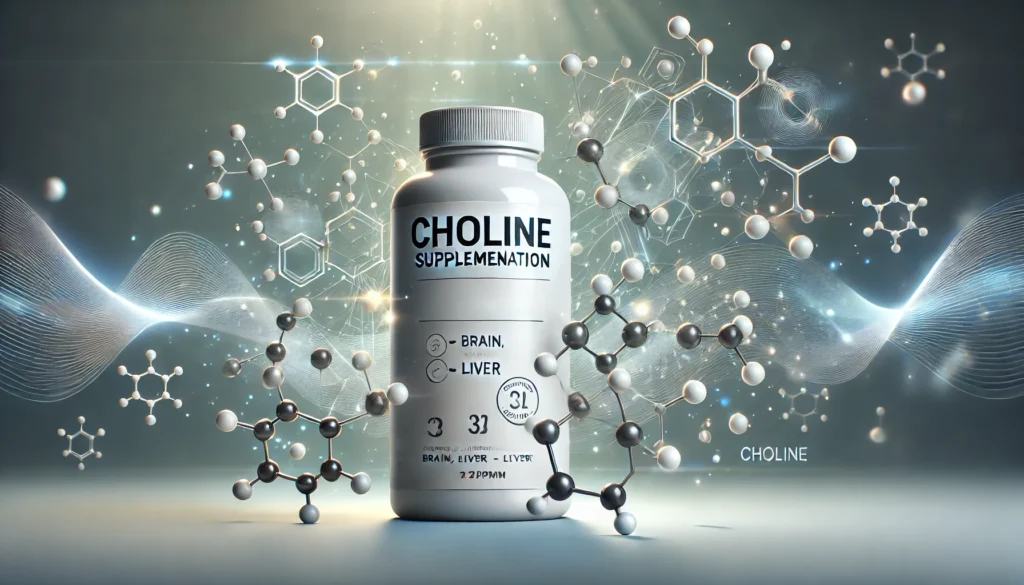A water-soluble vitamin called choline is crucial for human health since it involves several physiological functions. This nutrient is categorized as a nootropic supplement because of its advantageous effects on cognitive function, alertness, and focus. It is frequently paired with B vitamins. In order to help those looking to improve their cognitive capacities, this article strives to provide a thorough overview of choline’s nature, health advantages, ideal dosage, side effects, potential drug interactions, and responsible use. The chemistry of choline and its physiological mechanism of action on the body and brain will also be covered in detail.
You May Also Like:
American Elder: Benefits, Dosage, Side Effects, Drug Interactions, And Other Important Information
Choline: Benefits, Dosage, Side Effects, Drug Interactions, And Other Important Information is an original (NootropicsPlanet) article.
Nature of Choline
A necessary nutrient that is neither a vitamin nor a mineral is choline. Due to its resemblance in characteristics and functions to the B-vitamin family, it is a water-soluble organic molecule. Eggs, liver, soybeans, and fish are just some foods that naturally contain choline. The liver can also generate a tiny amount of choline.
The nitrogen atom in choline is positively charged and bound to three methyl groups, an alcohol group, and the quaternary ammonium salt. Its molecular composition makes it simple to pass through the blood-brain barrier and affects neuronal networks. Choline plays a role in several physiological processes in the body, including creating neurotransmitters, constructing cell membranes, and one-carbon metabolism. As a result, it is essential for preserving general health and promoting cognitive function.
Health Benefits of Choline
Many health advantages of choline include improvements in cognitive development and performance. The following are some of the main benefits:
- Better Memory and Cognitive Function: In animal models and human research, choline supplementation has improved memory performance and cognitive function. Choline, a precursor to acetylcholine, is vital for preserving healthy neurotransmitter levels necessary for memory formation, learning, and recall.
- Neuroprotection: Choline possesses neuroprotective qualities, providing defense against neurodegenerative conditions, including Parkinson’s and Alzheimer’s. It lessens inflammation and aids in preserving the structural integrity of neuronal cell membranes, which are linked to neurodegenerative processes.
- Prenatal Brain Development: The fetus’s optimal brain development depends on enough choline consumption during pregnancy. Choline plays a crucial role in developing neuronal connections, ensuring the baby’s brain grows as it should.
- Liver Health: Choline produces very low-density lipoproteins (VLDL) in the liver, which aids in preventing fat buildup in this vital organ. Choline shortage has been linked to fatty liver disease, according to studies.
Chemistry of Choline
The positively charged nitrogen atom in choline is bound to three methyl groups, an alcohol group, and a quaternary ammonium salt. Because of how closely its molecular structure mimics that of neurotransmitters, it can easily pass through the blood-brain barrier and affect different neurological circuits. The neurotransmitter acetylcholine, which is necessary for the efficient operation of the nervous system, is formed from choline, which functions as its precursor. Choline also has a role in the metabolism of homocysteine, which lowers the risk of cardiovascular disorders, and the creation of phosphatidylcholine, a necessary component of cell membranes.
Physiological Mechanism of Action
Many methods by which choline affects the body and brain contribute to its nootropic effects and other health advantages. The following are some of the main physiological mechanisms of action:
- Acetylcholine Synthesis: As a precursor to the neurotransmitter acetylcholine, choline is essential for ensuring the brain has this substance. Learning, memory consolidation, and attention are just a few of the cognitive activities that acetylcholine is engaged in. The availability of acetylcholine is increased by choline supplementation, which can improve cognitive performance, alertness, and focus.
- Phosphatidylcholine Synthesis: Choline produces phosphatidylcholine, a phospholipid vital to cell membranes. Phosphatidylcholine ensures normal cell signaling and functioning by preserving the structural integrity of neurons and other cells. Moreover, it is necessary for lipid raft production and specialized membrane regions that are crucial for neural signaling and plasticity.
- Regulation of Inflammation: It has been established that choline has anti-inflammatory effects, which can benefit the brain’s health. It is a precursor to the inflammatory process-related signaling molecule platelet-activating factor (PAF). Choline can control inflammation in the brain, preventing neurons from injury and enhancing general brain health by regulating the synthesis of PAF.
- One-Carbon Metabolism: Choline plays a role in one-carbon metabolism, a chain of metabolic processes required for DNA synthesis, maintenance, and methylation. Choline contributes to converting homocysteine to methionine as a methyl donor, an important mechanism that lowers the risk of cardiovascular diseases and supports various cognitive functions.
Understanding the physiological mechanisms by which choline affects the body and brain can help us better appreciate its potential as a nootropic supplement and its function in boosting general health. Choline is crucial for maintaining healthy brain function, alertness, and focus since it plays a role in acetylcholine synthesis, phosphatidylcholine creation, inflammatory control, and one-carbon metabolism.

Optimal Dosage of Choline
The ideal choline dosage varies depending on characteristics like age, sex, and particular medical conditions. The National Academy of Sciences has set Adequate Intake (AI) values for choline and are as follows:
- Infants (0-6 months): 125 mg/day
- Infants (7-12 months): 150 mg/day
- Children (1-3 years): 200 mg/day
- Children (4-8 years): 250 mg/day
- Children (9-13 years): 375 mg/day
- Males (14+ years): 550 mg/day
- Females (14-18 years): 400 mg/day
- Females (19+ years): 425 mg/day
- Pregnant women: 450-550 mg/day
- Lactating women: 550 mg/day
It is critical to remember that these figures pertain to overall health and may not accurately reflect the ideal dosage for improving cognitive function. The daily doses of choline used in studies looking into its effects on cognition have ranged from 250 mg to 2,000 mg. Nevertheless, before beginning any supplement regimen, it is essential to get medical advice, especially if the goal is cognitive improvement.
Side Effects of Choline
When ingested following the recommended daily dietary amounts, choline is usually regarded as safe. However, consuming too much choline may have unfavorable effects, such as:
- Digestive Problems: Excessive dosages of choline may result in gastrointestinal problems such as nausea, diarrhea, and stomach pain.
- Fishy Body Odor: Trimethylamine, produced when choline levels are too high, has a powerful fishy stench. Those who have trimethylaminuria, a genetic disorder that affects the body’s capacity to metabolize trimethylamine, are more likely to experience this adverse effect.
- Hypotension: Excessive choline intake has been linked to a decline in blood pressure, which in some people can result in lightheadedness and fainting.
- Increased Risk of Cardiovascular Disease: Some research suggests that excessive consumption of choline may raise one’s chance of developing cardiovascular disease since it produces trimethylamine N-oxide (TMAO), a substance linked to atherosclerosis. However, more studies are necessary to establish a causal relationship.
Potential Substance Interactions with Choline
Choline may interact with specific drugs and substances, reducing their effectiveness or having unfavorable effects. These interactions include, among others:
- Anticholinergic Drugs: By blocking the action of acetylcholine, these drugs may lessen the benefits of choline supplementation in improving cognitive performance.
- Cholinesterase Inhibitors: These medications treat Alzheimer’s disease and raise acetylcholine levels by preventing its breakdown. Supplementing with choline may increase acetylcholine levels too much, which might have adverse effects like bradycardia, excessive salivation, and muscle weakness.
- Methotrexate: Choline may prevent methotrexate, which is used to treat some malignancies and autoimmune disorders, from being absorbed. If you are using methotrexate, talk to a doctor before taking choline supplements.
Best Responsible Uses of Choline
Consider the following guidelines for appropriate use if you’re interested in utilizing choline as a nootropic supplement:
- Contact a medical expert first: Before beginning choline supplements, see a healthcare professional, especially if you have pre-existing diseases or are using drugs that may interfere with choline.
- Start with Low Doses: To gauge tolerance and identify the ideal choline dosage for cognitive improvement, start with a lower dosage and progressively increase it. This strategy can reduce any negative impacts that might occur.
- Choose a Reliable Source: Only buy choline supplements from reliable suppliers to ensure the highest caliber and purity.
- Track Progress: Analyze the effects of choline supplementation on mental performance regularly and change the dosage or supplementation schedule as necessary.
Choline:
Conclusion
Choline is a critical nutrient that supports cognitive health, liver function, cardiovascular health, pregnancy, muscle function, and cell membrane integrity. It is an essential component of a balanced diet for maintaining and improving overall health and well-being. Despite its numerous benefits, it is necessary to ensure an adequate choline intake through diet or supplementation, especially for populations with higher needs, such as pregnant women and individuals with certain health conditions. Consulting with a healthcare professional before starting choline supplementation is advisable to determine the appropriate dosage and avoid potential side effects.

References:
- What Is Choline? An Essential Nutrient With Many Benefits. Retrieved from: https://www.healthline.com/nutrition/what-is-choline
- Choline – Health Professional Fact Sheet. Retrieved from: https://ods.od.nih.gov/factsheets/Choline-HealthProfessional/
- Is choline deficiency an unrecognized factor in necrotizing enterocolitis of preterm infants?. Retrieved from: https://www.nature.com/articles/s41390-024-03212-5
- Are You Eating Enough Choline-Rich Foods?. Retrieved from: https://health.clevelandclinic.org/choline-foods
Important Note: The information contained in this article is for general informational purposes only, and should not be construed as health or medical advice, nor is it intended to diagnose, prevent, treat, or cure any disease or health condition. Before embarking on any diet, fitness regimen, or program of nutritional supplementation, it is advisable to consult your healthcare professional in order to determine its safety and probable efficacy in terms of your individual state of health.
Regarding Nutritional Supplements Or Other Non-Prescription Health Products: If any nutritional supplements or other non-prescription health products are mentioned in the foregoing article, any claims or statements made about them have not been evaluated by the U.S. Food and Drug Administration, and such nutritional supplements or other health products are not intended to diagnose, treat, cure, or prevent any disease.


